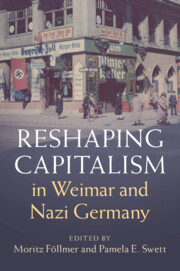Book contents
- Reshaping Capitalism in Weimar and Nazi Germany
- Publications of the German Historical Institute
- Reshaping Capitalism in Weimar and Nazi Germany
- Copyright page
- Contents
- Illustrations
- Contributors
- Acknowledgments
- Introduction Historicizing Capitalism in Germany, 1918–1945
- Part I Debating Capitalism
- 1 Capitalism and Agency in Interwar Germany
- 2 Aporias of “Political Capitalism” between World War I and the Depression
- 3 Searching for Order
- Part II Concealing Capitalism
- Part III Promoting Capitalism
- Part IV Racializing Capitalism
- Index
3 - Searching for Order
German Jurists Debate Economic Power, 1919–1949
from Part I - Debating Capitalism
Published online by Cambridge University Press: 20 January 2022
- Reshaping Capitalism in Weimar and Nazi Germany
- Publications of the German Historical Institute
- Reshaping Capitalism in Weimar and Nazi Germany
- Copyright page
- Contents
- Illustrations
- Contributors
- Acknowledgments
- Introduction Historicizing Capitalism in Germany, 1918–1945
- Part I Debating Capitalism
- 1 Capitalism and Agency in Interwar Germany
- 2 Aporias of “Political Capitalism” between World War I and the Depression
- 3 Searching for Order
- Part II Concealing Capitalism
- Part III Promoting Capitalism
- Part IV Racializing Capitalism
- Index
Summary
Jurists played a key role in shaping Germany’s political economy in the first half of the twentieth century. Used to thinking in terms of power and its checks and balances, these lawyers contributed to a drawn-out debate about the relationship between state and markets, private business and public interest. Faced with repeated economic crises and political turmoil, they came to agree that corporate power had reached a level undermining economic liberty and the political sovereign charged with its protection. Walking a fine line between liberal thinking and a preference for regulative state power to protect capitalism from itself, these jurists – here exemplified by Franz Böhm and Heinrich Kronstein – identified with the Republic although political loyalties proved changeable. While Böhm remained in Nazi Germany, rephrasing his thinking in line with the regime’s preferences, Kronstein went into exile, where he found a receptive audience among American trustbusters. Yet, on his return to postwar Germany he teamed up with Böhm once again, thereby boosting the political legitimacy of the emerging ordoliberal school and helping bring the long quest for a tamed capitalism to its conclusion.
Keywords
- Type
- Chapter
- Information
- Reshaping Capitalism in Weimar and Nazi Germany , pp. 85 - 114Publisher: Cambridge University PressPrint publication year: 2022



